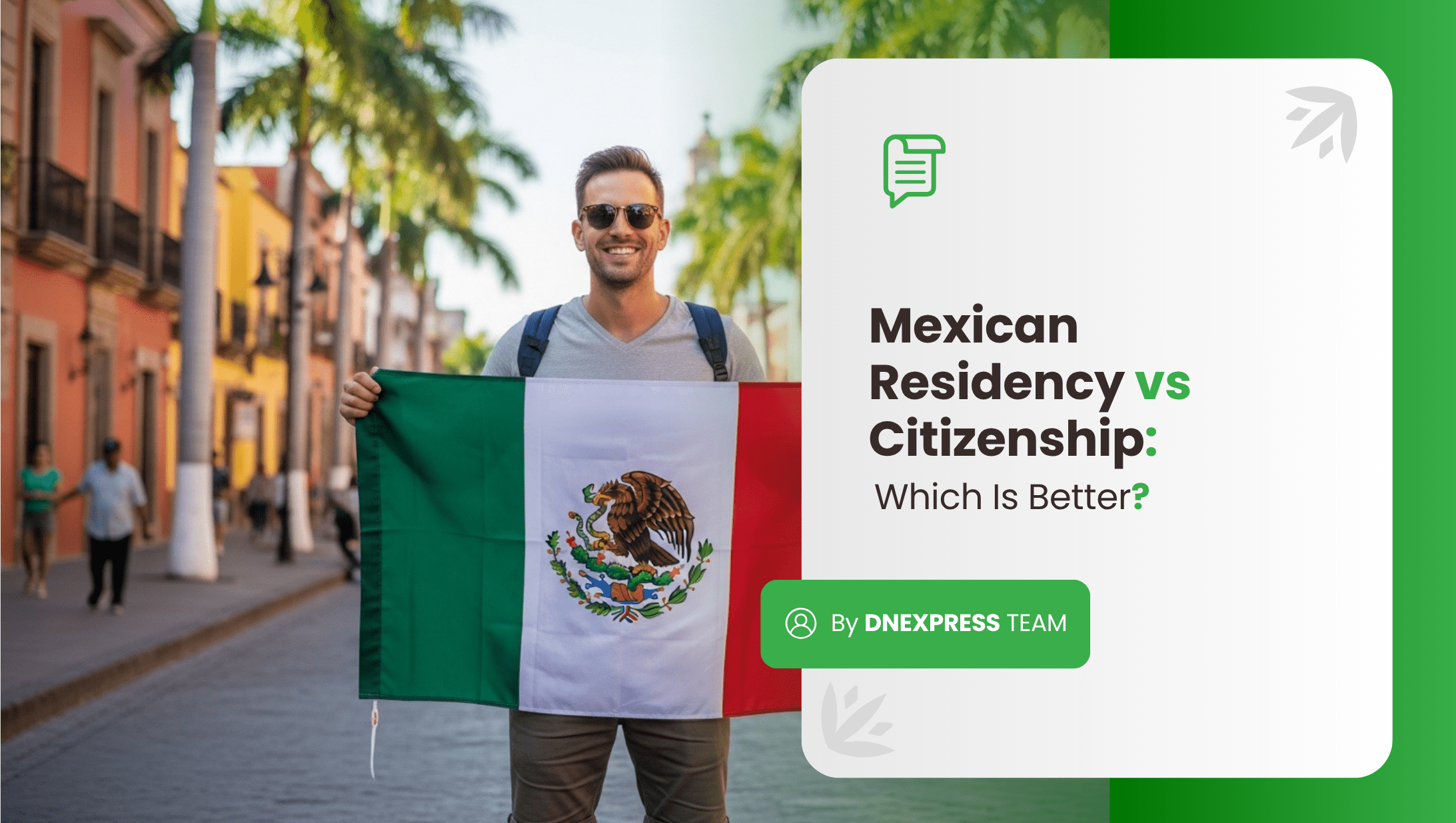
If you're a U.S. citizen considering life in Mexico, the difference between residency and citizenship can change everything. From what kind of ID you carry to whether your children can inherit Mexican nationality, the choice matters.
Here's what you need to know: Residency lets you live legally in Mexico long-term. Citizenship gives you full rights like voting, property ownership, and a passport, without giving up your American one.
✅ Residency is easier to get, great for retirees, investors, and temporary moves.
✅ Citizenship is for those reclaiming their roots or planning to stay for good, and comes with stronger legal benefits.
We help U.S.-born Mexicans and their families take the guesswork out of both paths. Whether you're fixing a birth certificate, skipping the consulate, or applying 100% from the U.S., we're here to make it easy and official.
Want to know exactly which one is right for your situation?
We'll break it down clearly below.
Keep reading to explore real stories, side-by-side comparisons, and legal insights from our binational team.
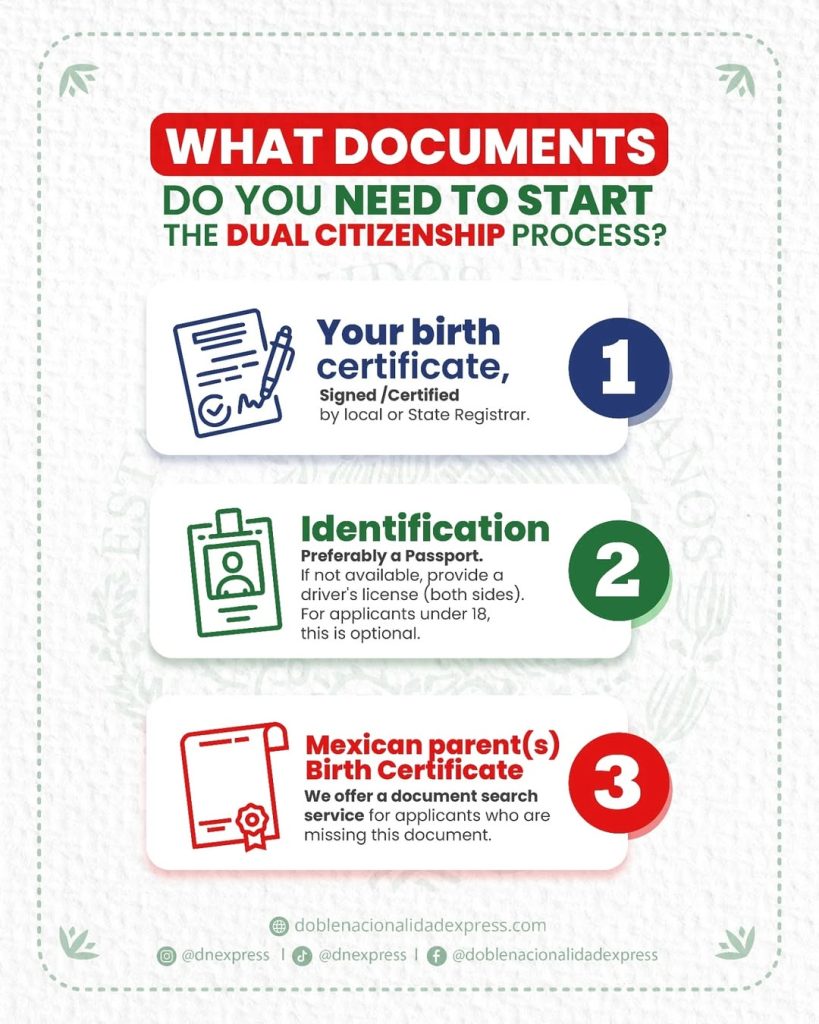
Residency vs Citizenship in Mexico
Before diving into personal scenarios, let's break down the key legal and lifestyle differences between residency and citizenship in Mexico.
This table reflects what we explain to every client, especially those unsure which path offers the most freedom or fits their long-term plans.
|
Feature |
Residency (Temporary or Permanent) |
Citizenship |
|
Voting Rights |
❌ No |
✅ Yes |
|
Passport |
❌ No |
✅ Yes |
|
Property in Restricted Zones |
❌ Requires trust (fideicomiso) |
✅ Full ownership |
|
Duration |
Temporary (up to 4 years), Permanent (indefinite) |
Lifetime |
|
Inheritance Rights |
Limited |
Full |
|
Bureaucracy |
Medium (fewer documents, faster approval) |
High (exams, translations, legal filings) |
|
Travel Outside Mexico |
More Flexible (can live abroad indefinitely) |
Limited (5+ years abroad may void citizenship) |
|
Job/Address Notification |
Required with INM |
Not required |
If you're starting out, residency may feel simpler and faster.
But if you want full rights, cultural recognition, or to simplify property and inheritance for your family, citizenship is a powerful next step.
Mexican Residency Explained: Who It's For and What It Gives You
Mexican residency is ideal for people who want to live, invest, retire, or reconnect with family in Mexico, without giving up their U.S. citizenship or jumping through the full naturalization process.
You can qualify for temporary residency through:
- Financial solvency (e.g. ~$3,000/month income or $50K in savings)
- Employment or work contracts in Mexico
- Family ties, like being married to a Mexican citizen or having a Mexican child
After holding temporary residency for four years, you become eligible to apply for permanent residency, which never expires and doesn't require renewals.
What Mexican Residency Gives You:
- The legal right to live in Mexico long-term
- Open a Mexican bank account and utilities
- Enroll in public or private healthcare systems (IMSS or Seguro Popular)
- Get a Mexican driver's license and CURP (national ID)
- Retain U.S. citizenship and receive help from your U.S. consulate if needed
- Avoid repeating the visa process every time you re-enter Mexico
❓ Does permanent residency mean I'm a citizen?
➤ No. While you may live in Mexico permanently, you are not a citizen and do not qualify for a Mexican passport, voting rights, or land ownership in restricted zones without a fideicomiso.
For many expats, retirees, or digital nomads, residency is enough.
But if you're looking to pass on rights to your children, avoid land restrictions, or vote in Mexican elections, residency is the beginning.
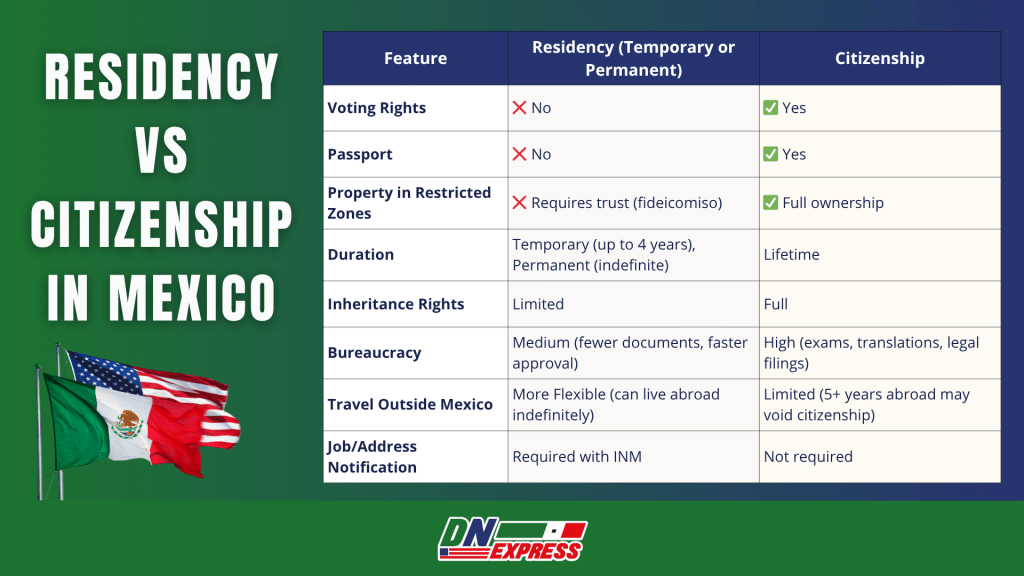
Mexican Citizenship: Why Some Go All the Way
For many of our clients, choosing Mexican citizenship over residency goes beyond legal considerations.
It's personal.
Whether you're reconnecting with your heritage, protecting family property, or securing a second passport, becoming a Mexican citizen opens a different set of rights and responsibilities.
What Mexican Citizenship Gives You:
- A Mexican passport, which allows easier travel and work rights across Latin America
- The right to vote, run for office, and participate in civic life
- Full property ownership, even in restricted coastal and border zones, with no fideicomiso required
- Inheritance and nationality benefits for your children, especially those born abroad
- Freedom from INM bureaucracy (no address/job reporting or visa renewals)
But there's also a bigger legal shift: naturalized citizens must reside in Mexico.
If you live outside the country for over five consecutive years, you may lose your naturalized status.
And yes, citizenship requires passing a history, culture, and Spanish test, unless you qualify by descent (e.g. a Mexican parent or grandparent), in which case no test is required.
What counts as residency in Mexico?
Valid physical presence with a legal immigration card (temporary or permanent). Time spent as a student doesn't count toward citizenship eligibility.
Pro Insight
While the naturalization form includes a “renounce other nationalities” clause, this does not impact your U.S. citizenship. The U.S. allows dual nationality, and so does Mexico.
Many of our clients are surprised how quickly they qualify, especially if they've been living in Mexico already or have a Mexican parent.
Citizenship goes beyond paperwork.
It's about unlocking long-term security and cultural recognition on both sides of the border.
Why Work with Doble Nacionalidad Express?
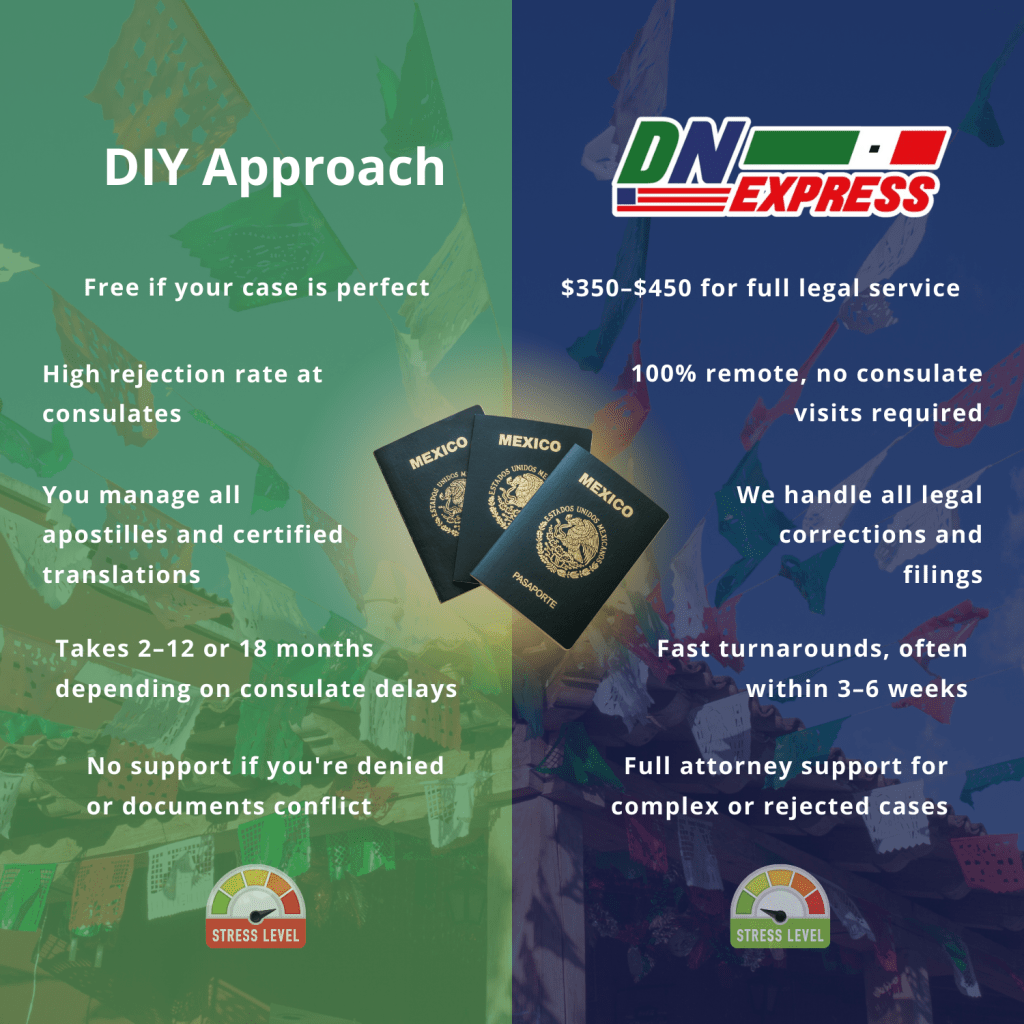
We've helped thousands of U.S.-based families reclaim their Mexican citizenship, correct their legal records, and finally move forward, without the stress of consulate visits, government delays, or confusing forms.
We exist because this process is harder than it should be.
Most people give up after one bad experience with a consulate.
Others don't even try because they're told they need a parent's help, or that a document error is impossible to fix.
We're here to prove otherwise.
What We Help You Do:
✔ Skip the consulate (no long lines or appointments)
✔ Fix document errors like name mismatches or dual birth registrations
✔ Claim your birthright, even decades later
✔ Register your U.S.-born kids so they grow up with both identities
✔ Apply 100% from the U.S., even if you're never in Mexico
✔ Overcome consulate denials with better legal strategy
✔ Work with qualified attorneys, not chatbots or paper-pushers
What Happens If You Try It Alone:
❌ Misfiled documents that delay or kill your case
❌ Rejection by consulates who won't explain why
❌ Missed deadlines due to confusing rules
❌ Wasted travel, fees, and time
❌ Years of frustration with no progress
We've built our entire business around making this accessible and respectful, especially for people who feel stuck, confused, or dismissed by the system.
We don't believe anyone should lose access to their heritage because of paperwork.
Ready to Take the Next Step?
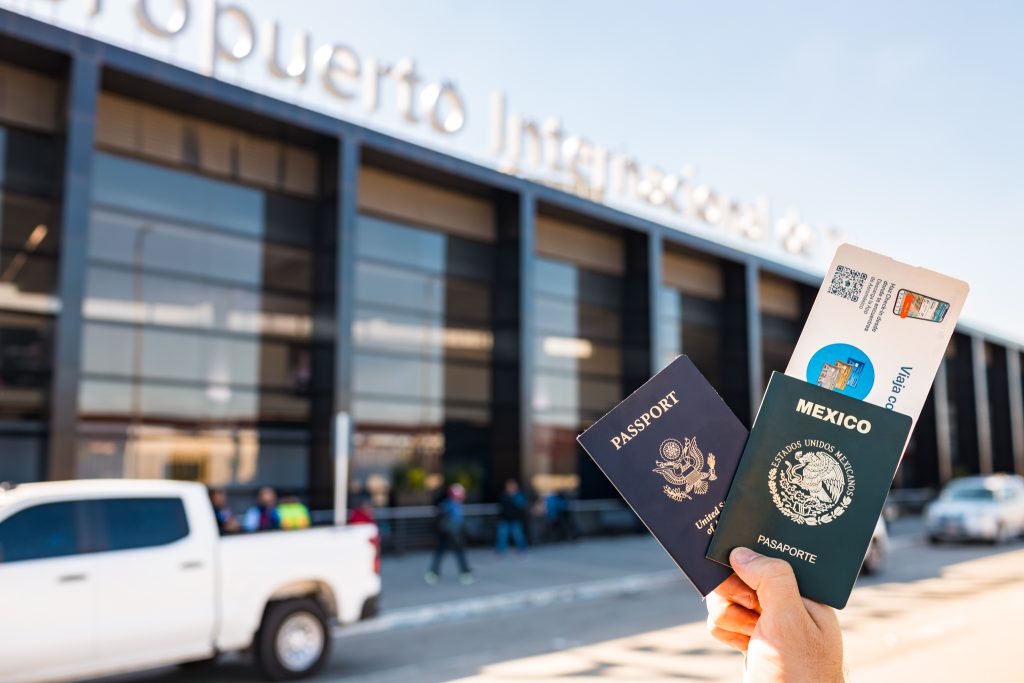
If you're still unsure whether Mexican residency or citizenship is the right path, that's completely normal.
Your situation is unique, and we're here to walk you through it, step by step.
Whether you're:
- Reclaiming your identity through a Mexican parent or grandparent
- Applying for your kids before it's too late
- Fixing an old document that's blocking your future
- Or simply tired of getting nowhere with the consulate
We've helped clients in your exact shoes.
💬 Call or Message Us on WhatsApp
There's no pressure, no judgment.
Honest legal support from a team that's walked this road many times before.
Because your identity shouldn't be stuck in paperwork limbo.
Let's make it official.
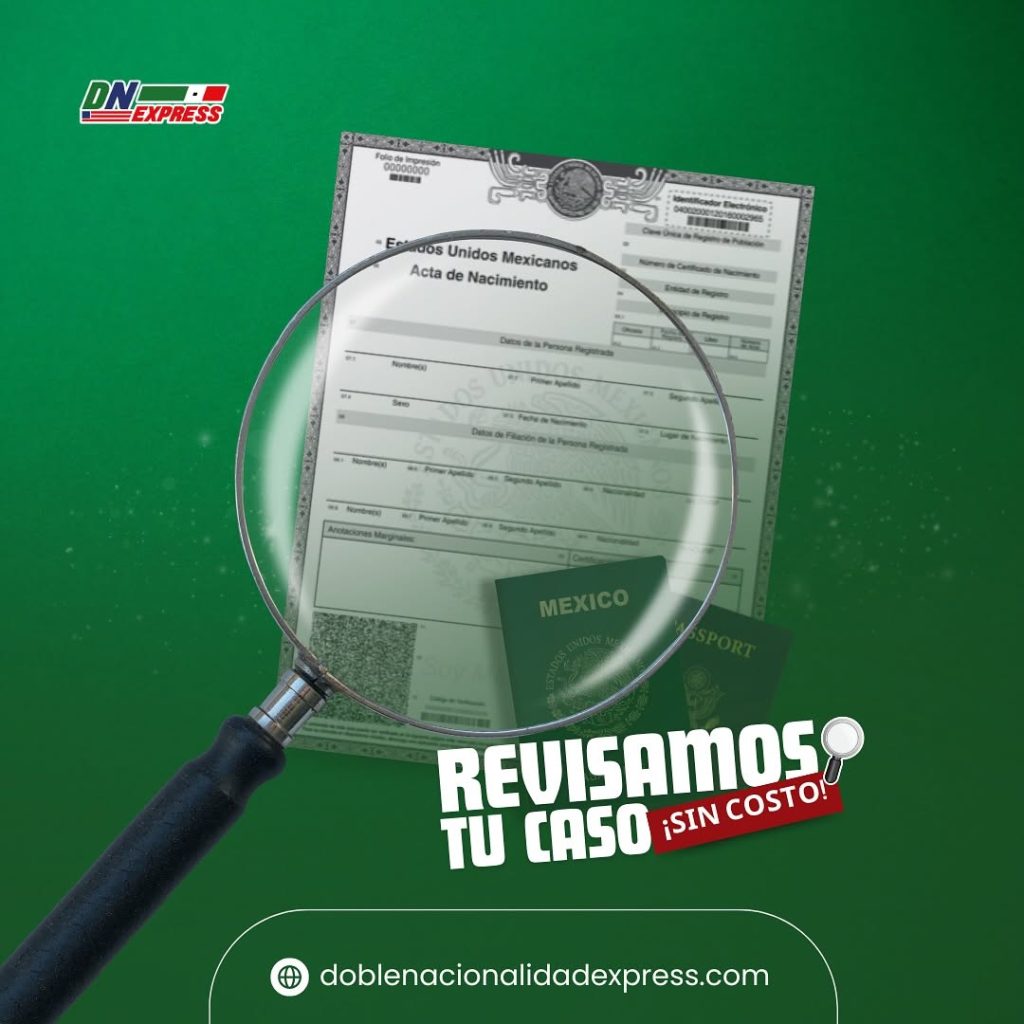
FAQ
No matter how straightforward the legal process looks online, real life often comes with complications.
These are the kinds of questions we hear every day, especially from U.S.-born Mexicans trying to claim what's already theirs.
If any of these feel familiar, know that these issues are solvable.
My birth certificate has the wrong place of birth in Mexico!
Many families registered their children in Mexico with incorrect details, sometimes listing them as born in Mexico when they were actually born in the U.S.
This can be corrected, but requires experienced legal handling to avoid triggering red flags.
My parent is estranged or incarcerated. How can I apply?
You don't need a parent's cooperation to claim citizenship.
If you have the right documents, even old or partial records, a legal team can often reconstruct your case and submit it without involving the parent.
What if I have two birth certificates, one U.S., one Mexico?
It happens frequently.
Dual birth registrations can be fixed with proper documentation and guidance.
But if left unaddressed, they may cause delays or rejections.
Will applying hurt my U.S. status?
Not at all. Both Mexico and the United States recognize dual citizenship.
Even if the Mexican naturalization paperwork includes a symbolic renunciation clause, your U.S. citizenship remains intact under American law.
These worries are valid, but they shouldn't stop you from moving forward.
With the right support, you can correct the paperwork, claim your rights, and protect your family's future on both sides of the border.



